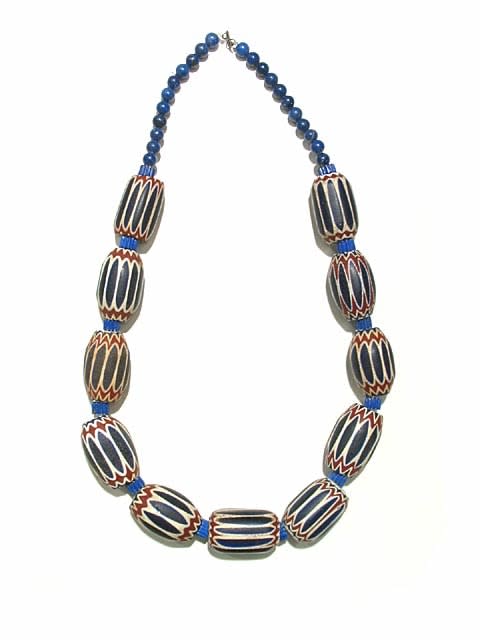Venetian Glass Chevron Bead Necklace, 16th Century CE - 18th Century CE
Glass and Beads
PF.6141
Further images
For over a thousand years, successive generations of Venetian glass artisans have passed their ancient handcraft down from master to apprentice. Even today in Venice, the art of hand fusing...
For over a thousand years, successive generations of Venetian glass artisans have passed their ancient handcraft down from master to apprentice. Even today in Venice, the art of hand fusing molten glass into beautiful multi-colored beads continues in the traditional manner. The Venetians produced many colorful designs, which were traded with African tribes for important items such as gold, ivory, and even slaves. This was definitely a study in relative value, since Western culture considered gold, for instance, much more valuable than the glass beads that they could produce in mass quantities. However, to the tribes of sub-Saharan Africa, these colorful beads became important components in both their rituals and personal adornment. Natural resources were plentiful on the African continent, but methods to produce the beautiful glass beads they desired were not. Thus these beads, like shells, became a form of currency recognized throughout the continent. Beads were desired both for their aesthetic beauty, as well as their rarity. When one considers that these beads might have been traded for their weight in gold, their true value to the Africans becomes clear. These were luxury item, manufactured and transported from exotic, far away lands. Such necklaces could only be afforded by the very wealthy, which often limited their ownership to kings, tribal chiefs, and their courts. Holding this necklace in our hands, we feel a weight and presence that is surely befitting of a king. We can imagine an annual ceremony perform long ago under the African sun, drums banging, dancers moving to the rhythms, when through the parted crowd descends a king dressed in the most elaborate, luxurious garments: gold rings and sandals, robes featuring European and Middle Eastern clothes, and a necklace made of thick colored Venetian beads.





